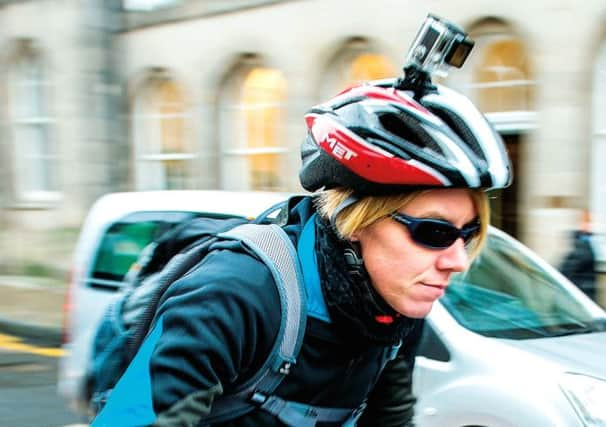Motorists convicted as bike-cam accepted in court


Footage from helmet and bike-mounted cameras has led to several successful prosecutions in Scotland, with further cases pending.
Lawyers welcomed the use of the cameras as providing clear evidence of offences, but motoring groups urged caution and warned that the devices should not be relied on.
Advertisement
Hide AdAdvertisement
Hide AdDave Brennan, who fitted cameras to his helmet and bike seven years ago, has used them to secure two convictions against drivers he said had endangered his safety.
Brennan, a clinical scientist at the Southern General Hospital in Glasgow, has a ten-mile cycle commute from Torrance in East Dunbartonshire.
His camera footage led to a driver pleading guilty to dangerous driving by slamming on his brakes in front of Brennan on a main road into Glasgow.
The driver, who was found to have been banned and uninsured, was fined.
In a second case, a van driver was convicted of careless driving after a video showed his trailer passing too close to Brennan on his bike.
The driver was fined and had penalty points added to his licence.
Brennan has five further cases pending, including some for dangerous driving.
CONNECT WITH THE SCOTSMAN
• Subscribe to our daily newsletter (requires registration) and get the latest news, sport and business headlines delivered to your inbox every morning
Advertisement
Hide AdAdvertisement
Hide AdHe said: “I got the cameras after a lot of incidents on my way to work, such as a van skimming my elbow.
“Cyclists are hugely vulnerable. Having a camera, if there is an incident, I can do something about it.
“If a driver is tailgating me, I turn round, and when they see the camera they pull back, so it can also adjust people’s behaviour.
“Cameras are absolutely critical – if I had gone to the police in these cases it would have been my word against the drivers’.”
Brenda Mitchell, the founder of law firm Cycle Law Scotland, said cameras were also a useful tool in civil cases involving compensation claims.
She said: “Video clips can be put to great use. They provide very powerful evidence, showing the scene as it unfolds. That has to be of enormous benefit.”
However, the Institute of Advanced Motorists said cameras could make things worse.
Policy and research director Neil Greig said: “I have mixed feelings about them, as I fear they often generate more stress and anger than they solve.
Advertisement
Hide AdAdvertisement
Hide Ad“If helmet cams make cyclists feel less vulnerable then they may lead to behaviour that increases risk rather than reduces it.
“The vast majority of drivers try their best to share the road safely with other users, but a moment’s inattention or lapse can lead to a life-threatening situation for a cyclist.”
But RAC spokesman Simon Williams said: “The increasing use of cyclist helmet cameras is clearly bringing a new dimension to the sometimes strained relationship between cyclists and motorists.
“The use of cameras can only do good, as they provide a true record of events that have occurred.
“Anyone obeying the law of the road and showing proper consideration for every other road user really has nothing to fear from their use.”
Police Scotland said cyclists’ video footage would be considered as evidence, but additional corroboration would still be required to secure a conviction.
Chief Superintendent Iain Murray, its head of roads policing, said: “In the aftermath of any incident, all possible sources of evidence are considered.
“If a helmet cam has been in use, then this will be viewed as part of that process.
Advertisement
Hide AdAdvertisement
Hide Ad“While it may be of benefit to the enquiry, it is important that riders do not put themselves or others at unnecessary risk in attempting to record or secure such footage.”
A spokesman for the Crown Office, which is in charge of prosecutions, said: “In assessing any case, we will look to see if the evidence is admissible, credible and reliable – whatever its source.”
SCOTSMAN TABLET AND IPHONE APPS